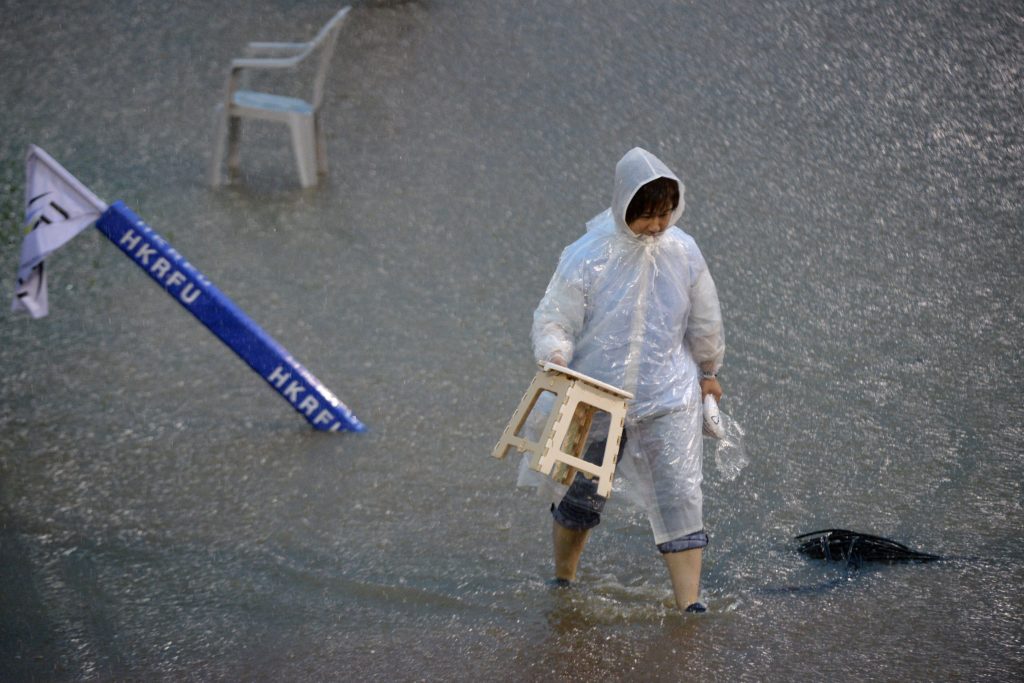The threat of typhoons and searing heat as well as the fluctuating form of the top teams could make for a frantic and largely unpredictable run into the World Cup playoffs, writes JON CARDINELLI.
Japan has been waiting for Typhoon Faxai to hit the east coast of Honshu since last week. Record winds and rain were expected around Tokyo on Sunday, and flights and trains in the capital were cancelled as a result.
What does this mean for the World Cup, which will kick off in Tokyo next Friday? As if the warm and humid conditions in Japan weren’t challenging enough, there’s a chance that the weather will shape the outcome of crucial pool contests and that some of the matches will be cancelled altogether.
Unlikely? That was my first thought. However, when you hear that the Wallabies have postponed their departure from Australia due to the aforementioned typhoon, you have to wonder.
ALSO READ: How natural hazards will affect RWC
The tournament rules state that the log points will be shared in the event of a pool match being cancelled due to bad weather. It’s going to be interesting to see how the top coaches respond thereafter.
Imagine a scenario that sees the New Zealand-South Africa clash in Yokohama cancelled and the All Blacks and Springboks receiving two log points apiece.
That would mean that the team that claims the most log points from the remaining three fixtures – and possibly the side that amasses the best points-differential – will go on to top Pool B and secure an “easier” game against Scotland or Japan in the final.
That’s assuming that Pool A plays out as expected and that none of those matches are cancelled or affected.
Spare a thought for the teams in Pool C – the Group of Death – as one or more of those games may also be decided by the weather and an opportunity to bank maximum log points will be missed.
The weather aside, there is bound to be a big upset or two over the course of the pool phase. And if past World Cups have taught us anything, it’s to expect the unexpected.
ALSO READ: Japan is no country for tired men
Everyone expected the All Blacks to win the 2007 World Cup tournament. Australia and New Zealand were both knocked out at the quarter-final stage, though, and the Boks went on to claim the Webb Ellis Cup.
Everybody expected the Boks to win the 2011 World Cup and for the All Blacks to choke yet again. But Australia’s loss to Ireland in the pool phase made a mockery of all pre-tournament predictions.
The Wallabies, rather than a limited Ireland side, finished second in that group and ended up facing the Boks in the quarter-finals. We all know how that turned out.
Other big upsets at that World Cup saw Tonga beating France, the team that would eventually go on to play the All Blacks in the final.
Japan beat the Boks in Brighton four years ago, a monumental result in isolation yet one that had not bearing on the final pool standings. Argentina beat a more-fancied Ireland team to advance to a semi-final stage that featured four southern-hemisphere teams.
Who could have predicted that England would fail to make the playoffs at their home World Cup?
The top teams have blown hot and cold more recently. New Zealand have suffered some big losses in the past 18 months, which has led many to ask whether they really deserve the tag of favourites. The Boks have improved during that period after enduring a nightmare run of results in 2016 and 2017.
Other big teams like Ireland and England have wobbled. Wales – the current Six Nations champions – have become a force again, but don’t have a particularly good record at World Cup tournaments.
The tournament in Japan promises to be the most fiercely contested World Cup in history. There will be a few surprise results, and the weather may cause a few upsets in terms of where the teams finish at the conclusion of the pool stage.
The bottom line is that no team can afford to take the result of a single game for granted.
Photo: Dale de la Rey/AFP/Getty Images





